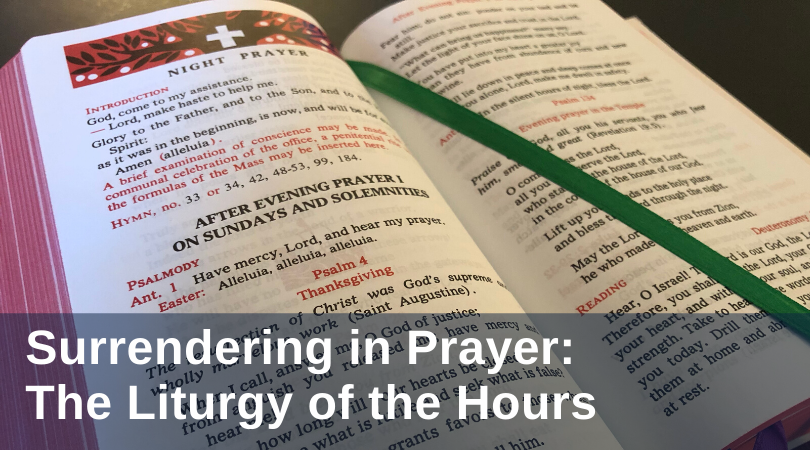
Since beginning my work as a high school theology teacher, I have had the privilege and burden of seeking to discover Christ in the places I inhabit, and the eyes of those I teach. It did not take long for me to realize that this is easier said than done! Acknowledging my struggle to recognize God’s presence in my daily life, I decided to take up a spiritual practice to ground my day. I started praying the Liturgy of the Hours—specifically Morning and Night Prayer—and quickly found myself immersed in the Psalms.
I detested this practice at first. The format of the prayers was confusing, and the Psalms I was reading were not necessarily the ones I would have chosen. Thanks to God’s grace and nothing else, I stuck with the practice, and started to notice something happening as I prayed the Psalms laid out for me by the Church: the surrender that comes from recognizing God’s faithful love.
“In you, my God, my body will rest in hope.”
—Antiphon to Psalm 16, Thursday Night Prayer
I surrender to God’s tender care for my body, my mind, my soul, and my whole life by relinquishing worry over things I cannot control.
“Because with the Lord there is mercy and fullness of redemption,
Israel indeed he will redeem from all its iniquity.”
—Psalm 130:7, Wednesday Night Prayer
I surrender to God’s timing in bringing all souls to himself, and release myself from impatience and the false desire to be someone else’s savior.
“Know that he, the Lord, is God.
He made us, we belong to him,
we are his people, the sheep of his flock.”
—Psalm 100:3, Friday, Morning Prayer, Weeks I and III
I surrender to the truth that I belong to God by letting go of self-reliance.
* * *
The list goes on. The more I prayed the Psalms, the more I began to see that they cover every human experience—rage, anguish, trust, triumph—sometimes all within the same breath. The Psalms reveal the tenderness of God, for they speak directly to the glory and pain of our humanity. How humble God must be to allow his words—the words of Scripture—to speak to our brokenness, and enter into that space in order to redeem it. How loving God must be to speak the glory of his presence into the desperation of our suffering.
While I was initially uncomfortable by the lack of choices involved in praying the Hours, I began to see the prescribed Psalms as gifts. I was not choosing the Psalms and canticles I prayed. Instead, God, through the maternity of the Church, was choosing them for me. By surrendering the desire to choose my own prayers, God was forming me through the prayers he had chosen. By placing the Psalms on my lips, I began to be shaped by those words which were not, at first, my own, but which nonetheless became my own. In the end, praying the Hours was like learning how to speak. By letting go of my own limited vocabulary, I was gifted with the words of the entire Church—both on earth and in heaven. In learning to speak to God using his own words of Scripture, it became easier to see how God was shaping me in other areas of my life, and easier to trust in his faithful love.
“The Lord is faithful in all his words and loving in all his deeds.
He is close to all who call him, who call on him from their hearts.”
—Psalm 145:13b, 18, Friday, Evening Prayer, Week IV
To be shaped by the Liturgy of the Hours is to become acquainted with God’s tender fidelity. While the Psalms reflect the erratic nature of the human experience, what shines forth brilliantly is the steadiness of God, and his faithfulness in every moment of history. God’s fidelity is one that our hearts ache to imitate. To be faithful to God’s call on my life is the only appropriate response to the lavish fidelity God has demonstrated to me, to the people of Israel, to the Church, and to the entire human family. When relationships, responsibilities of work and family, or missionary efforts seem burdensome, God’s own witness of fidelity lightens the load, for his “yoke is easy, and [his] burden is light” (Matthew 11:30).
If you, too, are interested in praying the Liturgy of the Hours, check out our Guide to Night Prayer for Lent.
This free, printable ebook includes:
- An abbreviated version of Night Prayer for Lent and the Triduum
- Video tutorials to learn the music or teach others to sing Night Prayer
- Helpful tips for praying in the home and singing psalms.



